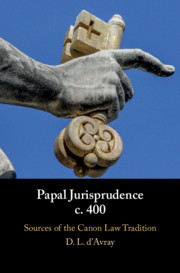Book contents
- Papal Jurisprudence c. 400
- Papal Jurisprudence c. 400
- Copyright page
- Dedication
- Contents
- Acknowledgements
- Abbreviations
- Manuscript Sigla
- 1 Introduction
- 2 The State of Research: Caspar and After
- 3 Texts and Manuscripts
- 4 Rituals and Liturgy
- 5 Status Hierarchy
- 6 Hierarchy of Authority
- 7 Celibacy
- 8 ‘Bigamy’
- 9 Marriage
- 10 Monks and the Secular Clergy
- 11 Heretics: Novatians, Bonosians, and Photinians
- 12 Heretics: In the Shadow of Augustine
- 13 Penance
- Epilogue
- Select Bibliography
- Index
5 - Status Hierarchy
Published online by Cambridge University Press: 13 December 2019
- Papal Jurisprudence c. 400
- Papal Jurisprudence c. 400
- Copyright page
- Dedication
- Contents
- Acknowledgements
- Abbreviations
- Manuscript Sigla
- 1 Introduction
- 2 The State of Research: Caspar and After
- 3 Texts and Manuscripts
- 4 Rituals and Liturgy
- 5 Status Hierarchy
- 6 Hierarchy of Authority
- 7 Celibacy
- 8 ‘Bigamy’
- 9 Marriage
- 10 Monks and the Secular Clergy
- 11 Heretics: Novatians, Bonosians, and Photinians
- 12 Heretics: In the Shadow of Augustine
- 13 Penance
- Epilogue
- Select Bibliography
- Index
Summary
The word ‘hierarchy’ can mean both status hierarchy and a hierarchy of command. The managerial hierarchy of a modern company is instrumental, not embedded in a system of meaning and values. Late Antique hierarchies of command were on the other hand integrated in the value system, but even so this hierarchy of power should be distinguished from status hierarchy, though the two were intertwined. Some societies have more hierarchy of the status sort than others. The Church of late Antiquity was on the high end of the hierarchy scale. There was a multiplicity of gradations of status within the clergy, as well as a sharp differentiation between clergy and laity.
Keywords
- Type
- Chapter
- Information
- Papal Jurisprudence c. 400Sources of the Canon Law Tradition, pp. 67 - 95Publisher: Cambridge University PressPrint publication year: 2019

